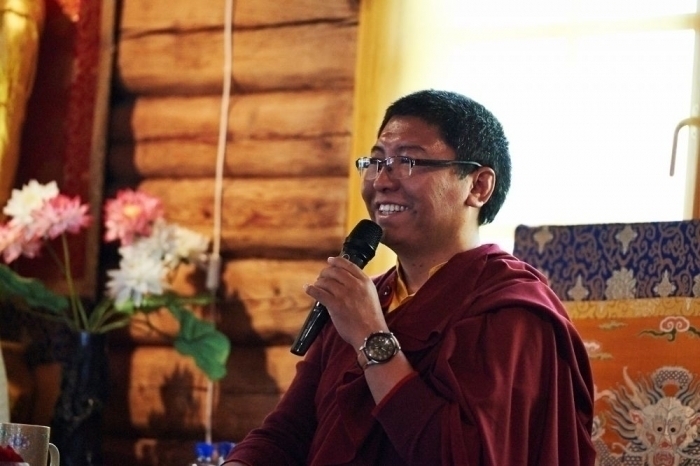
修行目的不是在追求美好的覺受
那麼,究竟是什麼障礙一個人,障礙一個修行者在精神道途上前進?是自私,自我珍愛的態度。對這點我們必須小心。很多人從事修持。他們已經修持了很多年。他們做了很多閉關,很可能已經達到一種平和、安好(well being)的狀態。那是很可能的。第一個目標,平和,這是可能完成的任務。但如果他們真的開始檢視自己,看看悲心是否增長或自私是否減少,那麼我想這些人裡大概只有百分之十的人能達到第三階段。其他人大部分停留在平和狀態中。因此,檢視自己並發現自己的自私很重要,這樣我們才能克服它而繼續修持。
請瞭解,對「感覺好一點」的追求,是一種輪迴性的目標。這全然是現世的追求,是借用佛法並利用其所有殊勝的方便來微調自我,使自我變成更適應、運作得更好的實體。「世俗目標」的定義,是以目標導向的心態來為自己完成某些事,以便「感覺很好」。我們可能利用精神修持來達成這個目標,一個很好的理由是它比別的方法更有效。如果我們在這個道途上,我們做了一點精神的修持,並且裝成是真誠地做。這種欺瞞,把自我取向和唯物目標藏在桌巾底下,可能包括了「我皈依佛、法、僧,所以我必然是純淨的。」之類的想法。
Fearless Simplicity , p. 31--發心
就算你只做一點點修持,也要試著以真摯無偽的方式來做:帶著真實的見地、禪修與行持來做。就算只有一小段時間,也要真實。否則,還不如一整個放棄,否則到最後,你可能只是用佛法來讓自己在困惑中陷得更深而已。
Fearless Simplicity , p. 21
要在佛法修持上真正進步,你也必須生起正確的動機。「我想要從事禪修來淨除一切障礙,特別是我的主要敵人──我執,並且利益一切有情。」如果你有這樣的動機,就會往證悟邁進,而非邁向建立強大健壯的自我。
Fearless Simplicity , p. 19
如果我們不知道如何在一開始就以真實的方式來激勵自己,佛法修持可能就不過是另一種每天吞維他命丸,讓「我」健康強壯的方式而已。當精神修持就只是營養補充品,你會在感覺能量低落或心情不好時用一點。你坐下來修持,讓自己感覺好一點。你試著透過修持來平衡自己,之後又回到日常活動。
Fearless Simplicity, p. 20-21
我們必須認真地關注這些問題:我真的是以真摯無偽的方式來修持嗎?我真正在進步嗎?我們需要一再一再地檢視自己。當我們修持愈多,基本的指導原則是:我們的煩亂情緒是否減少了?智慧是否開展增長?是或不是?我們應該以此方式誠實地檢視自己。
光只領受法教是不夠的;你一定要運用它、體驗它。此刻,我們仍被籠罩在迷惑經驗中。我們以自己的情緒和二元對立來替自己打造一個牢籠,並日復一日困坐其中。我們可以繼續待在這個牢籠裡,或者我們可以運用大圓滿的教導打破牢籠,以獲得自由。
Fearless Simplicity , p. 15
真的,若要修持佛法,你必須誠實面對自己,並且能夠欣賞你自己正在做的事。真實無偽的誠實和欣賞,會帶給你對生命的信心。
Fearless Simplicity , p. 21-22
如今我們擁有個人自由,可以賺到足夠的錢並照顧好自己。取而代之的是,我們有其它障礙佛法修持的問題,其中之一就是尋求即時滿足的傾向。有這麼多的小玩意兒和這麼多的情境可以讓自己投入,帶給我們即時的滿足。這件事本身不是問題;問題是我們的心習慣了立即的回饋,而我們被這種期待給綑縛住了。這是妨礙我們就在當下修持的主要障礙之一。
Fearless Simplicity , p. 366---精進
以上教法標示為英文版Fearless Simplicity之頁數
中文書譯名為大圓滿之道 http://www.pundarika.tw/?tw&book_13=330
The pursuit of ‘feeling better’
So what is it that prevents a person, a practitioner on the spiritual path, from proceeding? It is selfishness, the self-cherishing attitude. We have to be careful about this point. Many people do their practice. They’ve been practicing for years. They’ve done many retreats, and it’s quite likely that they have achieved a state of peace and well being. That’s quite possible. First goal, peace: mission possible. But if they really start to examine themselves to see if their compassion has grown or their selfishness has decreased, then I think maybe only ten per cent out of them have managed to achieve this third step. The rest are mostly remaining in that state of peace. Therefore, it is very important to examine ourselves and find out about our selfishness, so that we can overcome it and continue with the practice.
Please understand that the pursuit of ‘feeling better’ is a samsaric goal. It is a totally mundane pursuit that borrows from the Dharma and uses all its special methods in order to fine-tune ego into a fit and workable entity. The definition of a worldly aim is to try to achieve something for oneself with a goal-oriented frame of mind so that ‘I feel good.’ We may use spiritual practice to achieve this, one good reason being that it works much better than other methods. If we’re on this path, we do a little spiritual practice and pretend to be doing it sincerely. This kind of deception, hiding the ego-oriented, materialistic aim under the tablecloth, might include something like ‘I take refuge in the Buddha, Dharma, and Sangha, so I must be pure.’
Fearless Simplicity---P27-28
Even if you only practice a little bit, try to do it in a genuine way, with a true view, meditation and conduct. Even if it is only for a short while, let it be real. Otherwise, it is better to give it up all together, because you may wind up using the Dharma only to further ensnare yourself in confusion.
Fearless Simplicity---P20
To truly progress in Dharma practice, you also have to develop the proper motivation. ‘I want to engage in meditation to purify any obscurations, particularly my main enemy, ego-clinging, and benefit all sentient beings.’ If you have that kind of motivation, you will progress towards enlightenment, not towards building a strong healthy ego.
Fearless Simplicity---P18(spiritual practice-- Dharma practice)
If we do not know how to initially motivate ourselves in the true way, Dharma practice may be nothing more than another way of popping our daily vitamin pill, one to make ‘me’ strong and healthy. When spiritual practice is a dietary supplement, you apply it when you feel a little low on energy or a little upset. You sit down and practice to feel better. You try to balance yourself through practice and later return to your normal activities.
Fearless Simplicity---P19
We should be really concerned with these questions: Am I really practicing in a genuine way? Am I really progressing? We need to check ourselves, again and again. As we practice more and more, the basic guideline is: are our disturbing emotions diminishing? Is wisdom developing and increasing? Yes or no? We should examine ourselves honestly in this way?
It is not sufficient to only receive the teachings; you must apply them, live them. Right now, we are still enveloped in deluded experience. We have created a cage for ourselves out of our own emotions and duality, and here we sit, day in and day out. We can remain in this cage or we can use the Dzogchen instructions to break it open and become free.
Fearless Simplicity---P15
Really, to do dharma practice, you need to be honest with yourself and be able to appreciate what it is you are doing. True honesty and appreciation give you confidence in life.
Fearless Simplicity---P.20
These days we have personal freedom; we can make good money and take care of ourselves. Instead we have other problems that hinder Dharma practice, and one of them is the tendency to seek instant gratification. There are so many gadgets and so many situations we can put ourselves into that give us instant satisfaction. That itself is not the problem; the problem is actually that our minds get accustomed to immediate feedback, and we become bound by expecting it. This is one of the major obstacles to practicing on the spot.
Fearless Simplicity--- P.283
仁波切最新課程公告網址:http://www.pundarika.tw/?tw&news_16
仁波切課程報名即時通知:官方line@ ![]() Line@ID:@ydm7090w
Line@ID:@ydm7090w
愛的漣漪不斷~法佈施
幫助眾生開悟是佛法的核心價值。
《華嚴經普賢行願品》說:諸布施中,法布施為最。
維摩居士在上開經文中說:「法佈施是以身作則,如法修行,做一切眾生的榜樣,這是真正的法布施」。自己如實修行,也幫助眾生轉迷為悟,就是法佈施。人身難得,正法難遇,何其有幸,透過仁波切的教導,我們得以調整粗、細色身,讓自己成為放鬆、柔軟、有彈性的法器,安住在本覺中,自在地與各種好與不好的情緒、煩惱及生起的一切顯相共舞,信心充滿,遠離憂懼。
將仁波切的法教傳播出去,讓愛的漣漪不斷擴散,就是最殊勝的法佈施,自利利他,福慧雙修,功德無量。
分享方法:將仁波切的法教透過下方「分享鈕」分享至粉絲團、部落格、line、wechat、電郵、微博、推特,或經由簡訊等分享給親友。
